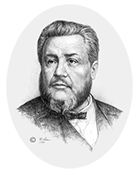Cast me not away from your presence,
and take not your Holy Spirit from me.
Psalm 51:11
Give me your patient attention, you who love the Lord, while I try to give you many reasons why such a prayer as this should arise out of the depths of your hearts, and leap from your lips. As for the first petition of the text, “Do not cast me away from your presence,” my brethren, we have need to present it, for God’s presence is to us our comfort amid affliction, for he is “a very present help in trouble.” It is our greatest delight: of all our true joys it is the source and sum, we call him by that name, “God our exceeding joy.” The Lord’s presence is our strength. God with us is our banner of victory. When he is not with us we are weaker than water, but in his might we are omnipotent. His presence is our sanctification: by beholding the glory of the Lord we become like him; communion with God has a transforming power upon us. This, too, is our highest glory: angels have no brighter honour. And this shall be our heaven hereafter, to dwell in the immediate and unveiled presence of the Lord in his own palace for ever. I cannot, however, dwell at length on this first part of the text, and therefore I have summarised the reasons for its use; but I shall ask for your attention for the second part while I enlarge it in greater detail. “Do not take your Holy Spirit from me.”
Remember, my brethren, it was the Holy Spirit who first of all regenerated us. If we have indeed been born again from above, our new birth was by the Holy Spirit: “Not by blood, nor by the will of the flesh, nor by the will of man, but by God,” we are made spiritual men today. If, therefore, we do not have the Spirit, or it is possible that the Spirit is taken from us, the very essence of our spiritual life is gone; we are utterly dead, we are no longer numbered with the living people of the living God. The Holy Spirit is not a luxury for us, but a necessity. We must have the Spirit of God or we do not live at all in a spiritual sense. If any man does not have the Spirit of Christ he is none of his; without the supernatural work of this divine person upon our nature we are not numbered with the family of God at all.
…Brethren, I shall speak pointedly to this church, over which the Holy Spirit has made me an overseer. Let us, my dear brethren, remember that there have been churches of old which God had cast away from his presence. Where are the churches of Asia that were once like golden lampstands? Where are Sardis, and Thyatira, and Laodicea? Can you find so much as a remnant of them? Are not their places empty, and void, and waste? Look at the church of Rome, once a martyr church, valiant for truth, and strong in the Lord, now the very personification of Antichrist, and utterly gone aside to the worship of images, and all manner of idolatries, an apostate and defiled thing, and no more a church of Christ at all. Now, what has happened to other churches may happen to this church, and we ought to be very earnestly on our guard lest it should happen. In your own time you yourselves have seen churches flourishing, multiplying, walking in peace and love, but for some reason not known to us, but perceived by the watcher who jealously surveys the churches of God, a root of bitterness has sprung up, divisions have devoured them, heresy has poisoned them, and the place that once gloried in them scarcely knows them now. They may be existing, but little more; dwindling in numbers, barren of grace, they are rather an encumbrance than a power for good. Remember, then, beloved, that the power of any church for good lies in the presence of God, and that sin in the church may grieve the Lord, so that he may no more frequent her courts, or go out with her armies. It is a dire calamity for a church when the Lord refuses any longer to bless her work, or reveal himself in her ordinances; then she is driven here and there by the wind like a barque derelict and castaway. The Lord may, because of sin, take away his Holy Spirit from a church. The spirit of love may depart, the spirit of prayer may cease, the spirit of zeal and earnestness may leave, and the spirit which converts the souls of men may display his power elsewhere, but not in the once favoured congregation. Let me impress upon you that all this may readily happen if we grieve the Holy Spirit as some churches have done. My beloved, let me refresh your memories with the memory that the great power of the church does not lie in the power of her organisations. You may have good schemes for work, wisely arranged and managed, but they will be a failure without the divine energy. Too often excellent methods are rigidly adhered to, and confidently relied upon, and yet without the Holy Spirit they are sheer folly.

